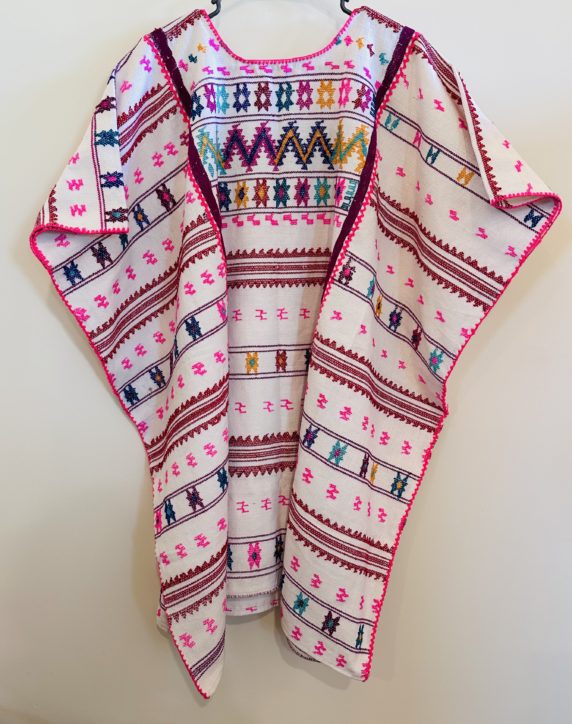This post is a bit “off target” — it has nothing to do with weaving and dyeing. It has everything to do with culture, health care, the delivery of health services, and inter-cultural exchange. As the lead development officer in a major U.S. school of nursing, I get a chance to see the impact that international education has on students and the development of skills and knowledge necessary to provide culturally competent, quality care to diverse populations in North Carolina.
I got an email a couple of weeks ago from one of our public health nursing faculty in the School of Nursing at UNC Chapel Hill who leads many of our international learning experiences. She asked if there was an opportunity for one of our students, Leilani, who is a rising senior, to volunteer in a public health clinic in the Oaxaca Valley, preferably in Teotitlan. Leilani’s plans to spend the summer volunteering in the Philippines had fallen through. Could I talk to the Chavez family, the faculty member asked, to see if this was possible and to see if the student could live with them for a month? Were there arrangements I could help make with a clinic to see if they would accept a Spanish-speaking volunteer from the U.S. to work side-by-side local doctors serving the health care needs of the local population? UNC Chapel Hill has a commitment to offering their students international learning experiences and Leilani will get academic credit for the month that she spends in the village doing community health service. Because the local health officials have never done this before, we are paving the way. Eric did the leg work, went to the local clinic to talk with the doctors, they liked the idea, asked the village and regional officials how to proceed, and this is what will happen next. Leilani will arrive, go to the district health office in Tlacolula, have an interview, and get official approval and documentation to give to the local clinic doctors in order to be accepted as a volunteer. I’ve asked Eric to help facilitate this contact for Leilani, so he will go with her. She is arriving on May 20 and leaving on June 19, and I am excited to hear all the details of her adventure and the impact that the experience will have on her future nursing career goals. Leilani had studied pre-med and is thinking about a career in nursing/medical anthropology. Stay tuned!







Expatriates in Mexico
Why do Americans and Canadians flock to Mexico? Is there more than an economic incentive to making this decision? What are the motivations and desires behind choosing to move to Mexico? Were expectations met? Was the vision of a life imagined reality or romance? These are some of the questions we will ask of several expatriates who make their home in the village of Teotitlan del Valle as one topic to explore during the documentary filmmaking workshop we are holding in the village starting January 31 (there are still three spaces open).
When I first visited Cuernavaca in the early 1970’s, I was vaguely aware of wealthy expatriate communities living there in gated communities. Now, many retirees are choosing San Miguel de Allende and Ajijic on Lake Chapala near Guadalajara because of lifestyle and affordability. These are isolated, gated communities, enclaves of expatriates who live separate and apart from the local people.
This is a different experience from the one I know in Teotitlan del Valle, where the few Estadounidenses residing there are fully integrated into the lifestyle and commerce of the village, living simply and sustainably in small homes or apartments on land or in family compounds owned by their Zapotec hosts. They keep a low profile, walk softly, pay attention to local customs, participate in local observances, give English classes or Shiatsu massage in exchange for food or services, and are friends and good neighbors. Most have come for the natural beauty, the peace and quiet, the call from a traditional culture that is family centered and respectful of the earth. Their expatriate status does set them apart (it is difficult not to stand out when you are a 5’9″ anglo woman, for example) but this is not a deterrent. These expats I know worked as social service or education professionals in the U.S. for many years, accumulated a small retirement fund, and determined that they could live a better quality life — for a longer period of time — by moving to Oaxaca. They make one or two visits a year back to the U.S. to visit family and friends. Most often, the family and friends come to Oaxaca to visit them, too.
It’s a relationship and a system that works well for a few. There is a significant expat community in Oaxaca city. I’m told that more than 300 people from countries outside of Mexico live there. You will find expats who own restaurants, bed and breakfast lodges, who write and make music and create art.
The key to enjoyment and satisfaction for this life, I believe, is integrating where you have come from with where you have chosen to live now — exploring and adopting the culture and people of your new home and making it your own.
Like this:
Comments Off on Expatriates in Mexico
Posted in Cultural Commentary, Oaxaca Mexico art and culture, Teotitlan del Valle, Travel & Tourism
Tagged Add new tag, Americans and Canadian emigres to Mexico, expatriates in Mexico, living in Mexico